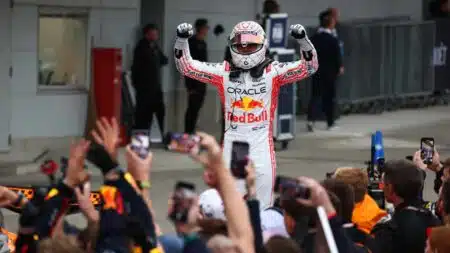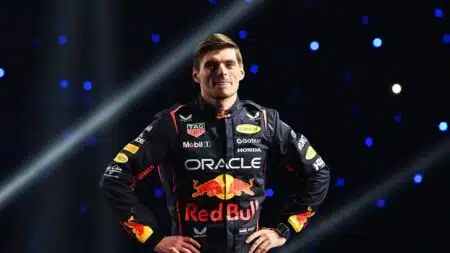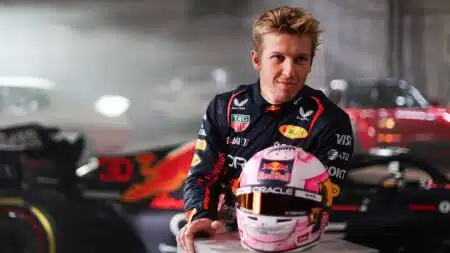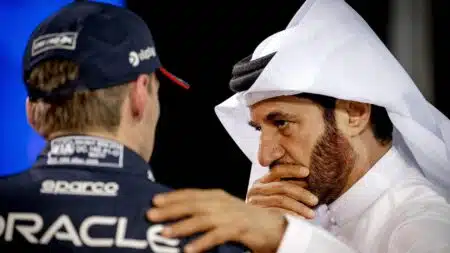
F1 snore-fest shows new cars badly needed: Up/Down Japanese GP
The 2025 Japanese GP showed a much more extreme change than next year's technical regulations is needed to make racing at classic F1 tracks interesting
So far as Volkswagen is concerned, the silly season is well and truly upon us. There are betting shops that will give odds on Volkswagen no longer trading by the end of next year, and speculators suggesting the share price will be hit so hard by the extent of the fines heading VW’s ways that it will be left exposed to corporate raiders and asset strippers who will mount an attack the company is unable to defend.
The business will be broken up, the juicy bits flogged off and that will be that for what is currently and in terms of production numbers, the largest car company in the world.
None of this is going to happen, not least because over 70 per cent of the voting rights are owned by the Porsche family and the Government of Lower Saxony together. However, the potential bill is so large as to defy understanding unless put into some kind of context. JP Morgan has estimated a worst-case scenario of €40 billion, which is greater than the entire GDP of countries like Serbia, Latvia, Estonia, Bahrain, Jordan and Ghana.
Even if, as seems likely, the final cost is rather lower there appears no doubt that the group is going to have to cut deep and fast to meet it. The question, then, is what?

Right now I’d not want to be involved in what might now be perceived to be expensive, VW-financed vanity projects. For example, you might ponder what future there can be for the Bugatti brand and the forthcoming 1500bhp Chiron, its long awaited replacement for the Veyron. In 2013 Berstein Research estimated Bugatti’s losses at almost £4 million for each and every Veyron it had produced after what was then eight years of production. And is Volkswagen now really going to go through with its promise to replace its own Phaeton luxury saloon when the same report claimed the last one lost the company £1.68 billion?
I’d be concerned too if I was in charge of most other VW luxury brands. Bentley can count itself lucky its Bentayga SUV is already rolling off the production line in Crewe, but it is believed still to be waiting for a green light from Wolfsburg to make the smaller, sportier coupe it is known desperately to want. I’d say the odds of amber turning to green have now lengthened dramatically.
And what of the Lamborghini SUV which has already got the go-ahead? It may be saved by the fact it can so easily be spun off the new platform already in production for the Audi Q7 and Bentayga. The fact it will at least double Lamborghini sales and bring profits the likes of which the brand has never seen before may prove just too tempting.
And you can expect Audi and Porsche production cars to be left largely alone too.
If you want an idea of just how golden is the Porsche goose to VW, consider that it made the same amount of profit last year (around £2 billion) selling 200,000 cars, as did VW selling over six million. That’s £10,000 per car as opposed to a little over three hundred quid. Audi made £3.75 billion on sales of 1.8 million cars, or over £2000 per unit, a stunning result by any standards save those of Porsche.

So while the odd interesting but unimportant project may get canned – I’d not bet on Porsche replacing the 918 Hybrid any time soon – I expect road car business will continue along existing lines. The VW brand by contrast can expect to be pared back to bare essentials: Polos, Golfs, Passats and the like, plus the SUVs that sell so well in the US and China.
Competition car budgets are another matter. Eddie Jordan announced to the world last month that VW was on the point of buying Red Bull Racing and would enter F1 with an Audi-branded car powered by a VW engine in 2018. But unless Dietrich Mateschitz already had the agreement in blood in advance of VW’s world imploding, I simply cannot see it happening.
It costs close to £350 million just to run a top team in F1 for a single year, not including the hideous cost of designing a brand new F1 engine from scratch, and that’s before you consider the likely PR train wreck of VW piling into the ultra-glamorous world of F1 while customers in their Polos and Golfs have been so appallingly misled. You might also very well conclude that after three wildly successful seasons, now might be a very good time for VW to call time on its WRC campaign.
As for Audi’s monumentally successful sports car programme, what better time to make a dignified exit? It’s been utterly dominant for 15 seasons, but now Porsche is in the ascendant and Audi’s cars are powered by diesel, which may shortly prove a rather unfashionable choice. Audi can retire with its head held high, citing the seemingly undeniable truth that same series inter-brand rivalry within the Group is a luxury VW can no longer afford.

I’d bet Porsche’s competition programme is the only one not under threat: the money has already been spent building its WEC team, the first fruits are only now being delivered, no Porsche road car has been powered by an offending engine and the marque is sufficiently distant from VW not to be too negatively affected by the fall out.
Even so, the truth is that none of VW’s brands will escape the scandal unscathed, not least because for years Volkswagen has spent more on R&D than any other company on earth. Last year alone it spent $13.5 million, half as much again as Toyota, the next biggest investor in the industry. With what VW now faces, that policy is no longer sustainable.
It means even those new car programmes that are allowed to continue will have to do so with far less than originally envisaged. And when you consider that the various lawsuits and class actions brought against VW will likely rumble on for many years before the total loss is quantifiable, the implications of this on new car programmes not yet even in the planning phase are starting to hove into view.
Add the fact that it takes up to five years to develop a new car from scratch and it now seems clear that the ill-considered and illegal actions of what may yet amount to a relatively small number of engineers will have ramifications for VW and its customers over a period of time best measured not in years, but decades.

The 2025 Japanese GP showed a much more extreme change than next year's technical regulations is needed to make racing at classic F1 tracks interesting

Max Verstappen looks set to be pitched into a hectic, high-stakes battle for F1 victories in 2025, between at least four teams. How will fans react if he resorts to his trademark strongman tactics?

Red Bull has a new team-mate for Max Verstappen in 2025 – punchy F1 firebrand Liam Lawson could finally be the raw racer it needs in the second seat

The 2024 F1 season was one of the wildest every seen, for on-track action and behind-the-scenes intrigue – James Elson predicts how 2025 could go even further